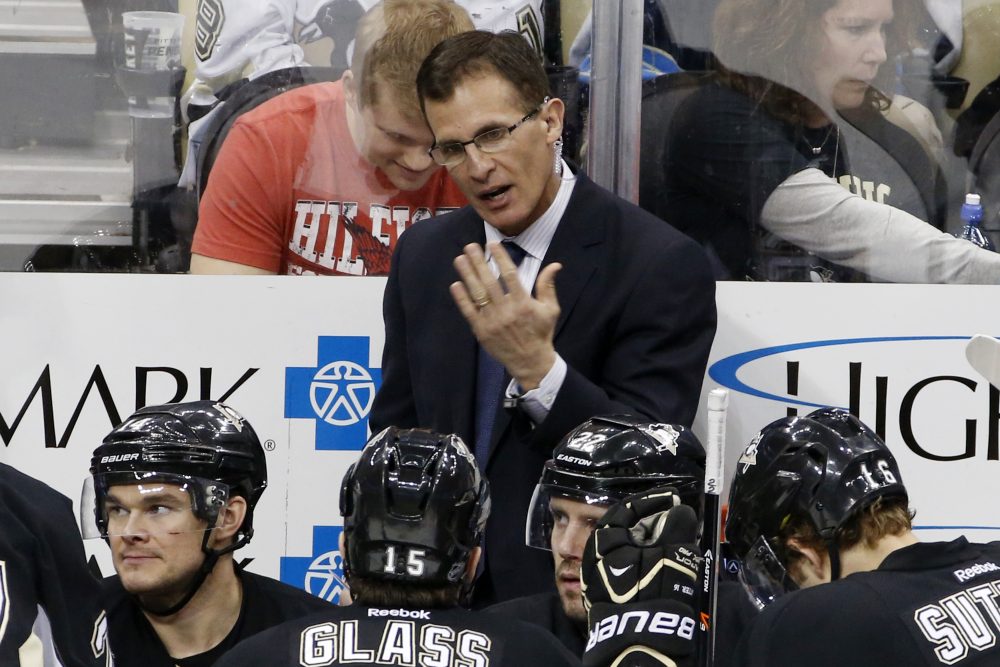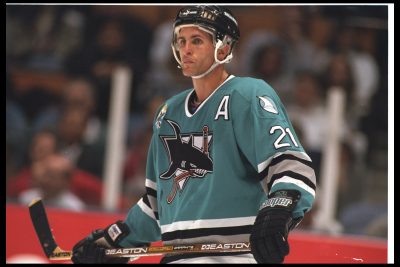Advertisement
Tony Granato Is Back At Wisconsin To Finish What He Started

I’m not sure what I expected when I got on the line with Tony Granato, the University of Wisconsin’s new men’s head hockey coach. I’m pretty sure I didn’t think he was going to suggest I hop on an airplane and visit the school’s campus in Madison.
"It’s a special place," Granato says. "You know, all the other places and stops that I’ve had — I was in San Jose, I was in LA, I was in New York and then Colorado, Pittsburgh, Detroit — they were all great. They were great places to live, but this is home. It was in my heart and I was wondering how I was gonna get back there and be part of it."
Granato left Wisconsin in 1987. A year later, he began his NHL career with the New York Rangers.
After 13 years as an NHL player with New York, LA and San Jose, Granato became an NHL coach. But as he packed his bags and moved, and packed his bags and moved again, he carried with him a regret for something unfinished.
It all started back in the mid-80s, when he was a student-athlete at Wisconsin.
'It Was All About Hockey'
"I was an OK student. I was able to find ways to get good grades. I took classes that I enjoyed," Granato says. "But I enjoyed them when I was in the classroom. Once I left the classroom, it was all about hockey."
Granato was a two-time All-American. But playing for the Badgers wasn’t the only thing distracting him from his studies.
"I was fortunate enough to play on the U.S. national team my sophomore, junior and senior years, so every second semester those years I would drop down classes because I would miss a month of school to go over and play in the world championships," he said. "So I fell a little bit behind."
Granato had to take summer classes just to stay eligible. Come senior year, he was too far behind to graduate. He left Wisconsin about 20 credits shy of his degree. But he came back every summer during the NHL offseason to try to finish, at least for a while.
"I wanted to graduate," he says. "I wanted to challenge myself to see if I could do it in the summer. So I did come back. Got a couple good classes under my belt and felt pretty good about my direction of pursuing a degree. And then, the children came. So I put it off, saying, 'Hey, maybe someday, maybe someday.'"
Advertisement
Granato and his wife, Linda, had four children in five years. He says things got “pretty busy.” And, after long hockey seasons that kept him away from his family, he just didn’t have the heart to tell his kids that he’d be spending his summers in the classroom.
"I thought about online classes, and in the back of my mind I thought, 'Well, maybe when I’m done playing, I’d do it,'" Granato says. "And then, obviously, I jumped right into coaching. So that wasn’t a great opportunity to do it either."
Granato spent 14 years as an NHL assistant and head coach — that’s what took him to Colorado, Pittsburgh and Detroit. But his heart was still in Wisconsin. He just never thought he’d have the chance to go back.
"I was asked over the years: 'Would you ever go back and coach college?' And I said, 'Well, I can’t do that right now because I don’t have my degree.'"
Unfinished Business

Wisconsin requires head coaches to have college degrees. So, when Barry Alvarez, Wisconsin’s athletic director, called Granato last spring, it was only to ask for his opinion. Wisconsin was in the market for a new head hockey coach, and one of the top candidates was Granato’s brother. Another was a coach he’d worked with for many years. Granato says he told Alvarez that he couldn’t go wrong with either choice.
"And then he asked me: 'Well, would you be interested?' And I said 'I won’t do it. I won’t interview against my brother and a good friend and someone who I think would be outstanding at the position.' And he made this suggestion: 'Why don’t all three of you come together?'"
That was OK with Granato’s brother, Don, and friend, Mark Osiecki. But there was that other issue. Granato still hadn’t gotten around to finishing his degree.
"I brought that up right away," Granato says. "I said, 'Hey Barry, I’m short credits.' I said, 'I think I’m short 10 to 15.' And he goes, 'Well let me check on it and I’ll get right back to you.' And he went and checked the records and called right back and said, 'If you’re able to commit to pursuing your degree and getting it within one year, we’re good. We’re doing the hire.'"
Which would mean that 52-year-old Tony Granato would have to go back to school and sit in the same classrooms as his players — guys less than half his age.
And why not? Granato’s kids were grown. And he always said he’d finish that degree someday.
Back To Being A Badger
So, Granato said yes. Which is not to say that he wasn’t worried.
"Well, a 52-year-old guy walking in with college students is somewhat intimidating," he says. "Was I gonna be able to understand what the professor was saying? Was I gonna be able to do OK in the classes? I don’t just wanna get through the class and get by, now I wanna challenge myself to be able to do well on it. So, you know, when I walked in there, you’re nervous. It was first day back at school in 30-something years, so those were good nerves."
Granato’s wife had bought him a backpack and some folders to keep him organized. But, as it turns out, school supplies have changed over the past 30 years.
"I get into class and I pull out my notebook and my paper and my pencil and I’m ready to take notes, and everybody else pops their computers out," Granato says. "I was rusty. I think I probably studied, you know, four times as much as I needed to. But it’s gone well. I really, I think I’ve learned a lot more about learning the second time through. I think I’m absorbing more."
That’s not the only benefit of being a student-coach.
"Now I know what our student-athletes are going through. I know the pressures of having to take tests. I know the pressures of having to be in class every day," Granato says. "I have not pulled all-nighters. Fortunately, hopefully, I won’t have to. I missed one class for a funeral. I missed one class for a recruiting trip. Other than that, my attendance has been perfect. And I think if you go to class and you’re there and you take notes, you’re not going to fall behind."
"That’s something you can say to your players, right?" I say. "You can say from experience, 'This is all you gotta do, guys.'"
"I’ve mentioned that. They look at me kinda funny sometimes," he says.
Granato’s finishing his degree in human development and family studies. He chose that major back in the '80s because he was thinking about getting into teaching. Now, he says, his studies are helping him become a better coach.
"I was asked over the years: 'Would you ever go back and coach college?' And I said, 'Well, I can’t do that right now because I don’t have my degree.'"
Some of Granato’s players need the same classes that he’s taking, but none of them have signed up to sit in a room alongside their coach … at least not yet.
But when Granato talks to his players — and their parents — about the importance of getting an education, they know he’s serious.
"You know, when you start coaching college, you almost think like a parent," he says. "You got a lot more responsibility of helping them develop not only on the ice, but also as students and as young men. I’d love 'em all to play in the NHL. They’re not all gonna go to the NHL and play in the NHL. If they don’t have a chance to play professional hockey, I want 'em to be ready to have opportunities that they’ll do well in and be ready for."
Looking Forward To May
As for Tony Granato’s own kids, they’ve all graduated from college, except his youngest — a daughter — who will just barely edge out her father for a college degree this May.
"Do you plan to walk at graduation?" I ask.
"Well, I do. Here’s the problem," he says. "So, my daughter is gonna graduate from CU the day before. So I will certainly be at hers and, if we can conveniently make it back before mine, I will definitely do that."
But walking across a stage isn't the most important graduation ritual in Tony Granato's house.
"This is another thing that I’ve done — and my kids have all laughed at me -- so I had a son graduate from Arizona State, I had a son graduate from Tufts University, I had a son graduate from Santa Clara University, and, at each of their graduations, I’ve put their gowns on and caps and taken pictures with me wearing them," he says. "So I will do that with my daughter's. I’ll have my cap and gown from those four universities, and then the fifth one will be here from the University of Wisconsin."
"And what do you think that will feel like after all this time? To have it be yours instead of theirs?" I ask.
"It’ll be exciting. I’m sure it’ll be somewhat emotional, too, 'cause it’s been a long journey," Granato says. "Being able to find time to get through it is something that I’ll be proud of. It’s gonna be a great day, for sure."
Granato doesn't expect other college coaches to start going back to school, even if Wisconsin has a great season under their student-coach.
"I would say most college coaches have already gotten their degrees," he says.
Under Tony Granato, the coach, Wisconsin is already much improved over last year.
And Tony Granato, the student, says he’s enjoying his back-to-school experience so much that he hopes to keep taking classes, even after he no longer has to.
This segment aired on December 3, 2016.
